Footballer rebuilds life in Mansfield after Syrian nightmare
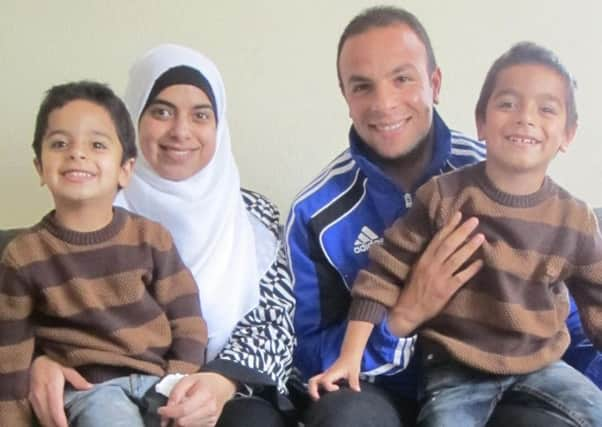

The echoes of gunfire, brutal and deadly street battles between rebel brigades and pro-Assad militiamen near his home in the city of Homs, convinced the then father of one to move his young family to his parents’ house.
It was a decision that may have saved their lives, as he returned soon after to find the house destroyed – a sight which prompted them to leave the country and ultimately move to England four years later.
Advertisement
Hide AdAdvertisement
Hide Ad“Losing the house is better than losing your life - it was time to save the family,” Saleh tells BBC Sport, through an interpreter.
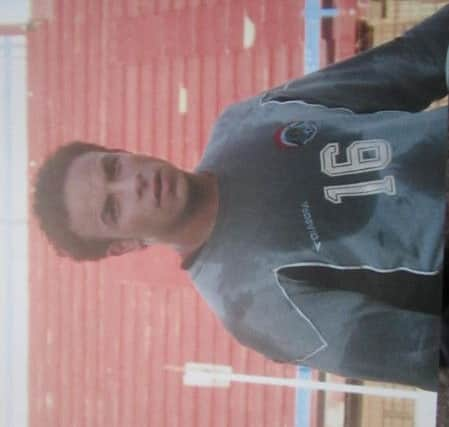

“I went back to see what was happening, to see if I could salvage a few things, but everything was burned.
“There was a guestroom with all my memorabilia, medals, trophies, and it was gone – everything was gone.
“The house that you work hard to have, the home and life you establish, in a moment it is all gone.”
Advertisement
Hide AdAdvertisement
Hide AdSaleh, aged 31, used to play for Homs-based Al-Karamah, one of Syria’s biggest clubs, winning several domestic league and cup honours and also taking part in Asian Champions League and AFC Cup campaigns.
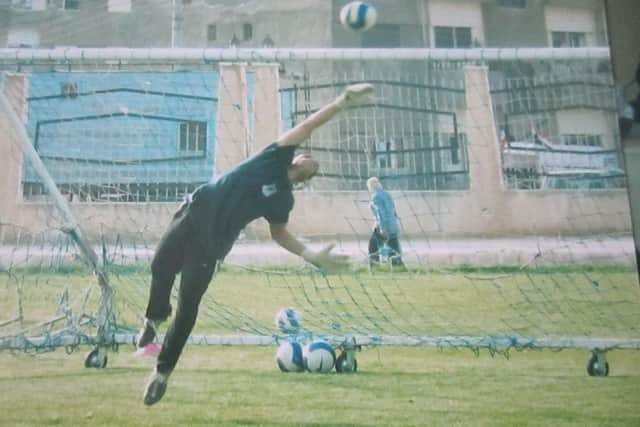

Now, in the front room of a modest semi-detached home in Mansfield, he sits with his wife Tahrir Alokla and their two children Nour, aged five, and three-year-old Omar and talks about how he wants to rebuild his life and football career in England.
“I’ve had the passion for football since I was a young child and I will work to be the best goalkeeping coach in the world,” says Saleh, who also hopes to continue playing in England.
“This is my dream and I realise that I won’t be able to do it on my own without the support of the community as well to push me to where I can serve best.”
Advertisement
Hide AdAdvertisement
Hide AdSaleh and his family were resettled in Mansfield under a United Nations programme in December 2015, four years after his football career helped him flee Syria for the United Arab Emirates, and subsequently Jordan.
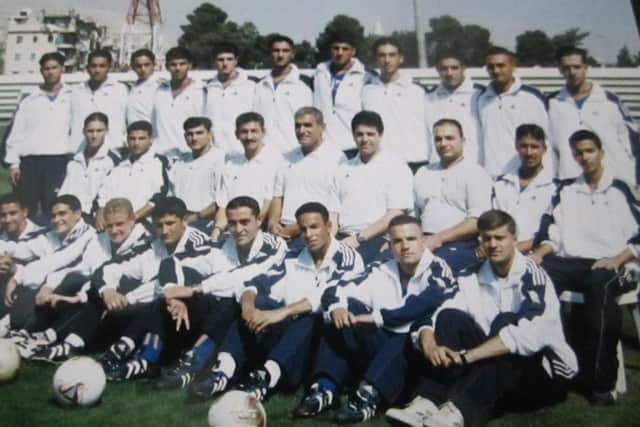

They are among more than 4.8 million registered Syrian refugees and were selected through the UN Refugee Agency for 2010 relocation as being among the most vulnerable.
More than 250,000 Syrians have died since the conflict began with a series of pro-democracy protests in March 2011.
Homs, one of the country’s most important industrial centres, with a population of 1.5 million before the uprising, was dubbed the “capital of the revolution” after residents embraced the call to overthrow President Bashar al-Assad.
Advertisement
Hide AdAdvertisement
Hide AdOne of Saleh’s club-mates and fellow goalkeeper, Abdelbaset Sarout, has become a leading figure among the rebels fighting to overthrow the Assad regime.
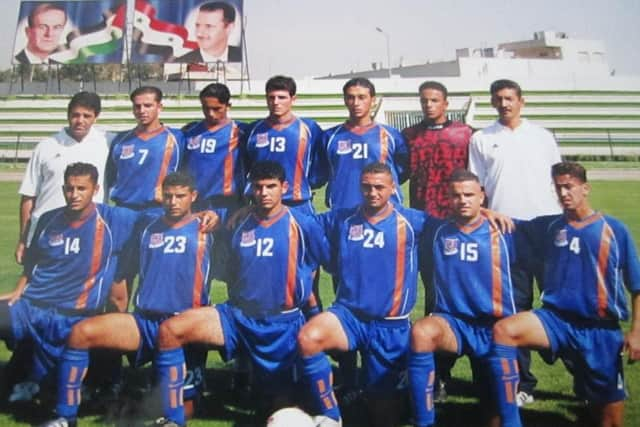

Mosab Balhous, Syria’s and Al-Karamah’s first-choice goalkeeper for much of Saleh’s career in his homeland, was arrested in 2011 on charges of supporting opposition movements and sheltering rebel fighters, and vanished for a year before suddenly rejoining the national squad in 2012.
Saleh and his wife weep as they talk about the fate of two former team-mates, Ahmad Swedan and Jihad Qassab – the latter once Syria’s captain, who was reportedly tortured to death in prison in October.
“These are the people I played with since childhood, we shared so much,” he recalls. “These are people who gave joy to fans.”
Advertisement
Hide AdAdvertisement
Hide AdAn invitation to play in the UAE offered Saleh and his family a chance of escape, and they fled Syria, leaving the club that he gave up school for aged 13.
“I wasn’t involved in the troubles, I was a sportsperson,” he says. “My place wasn’t there anymore.
“After I left, the club contacted me to come back. I didn’t feel comfortable about the risk. I could see how volatile it was and I had a family to think about as well.
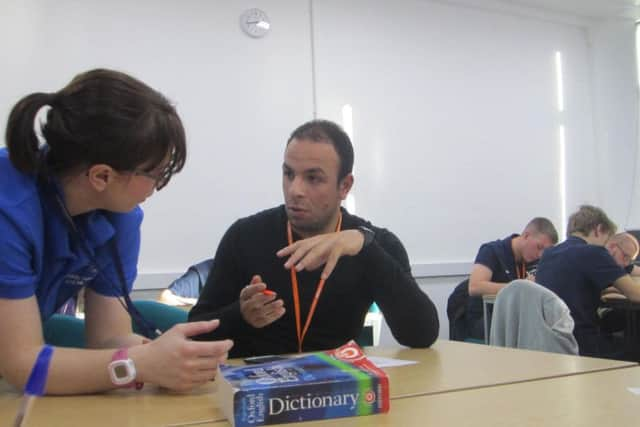

“It was very hard to say no, but life is more important than playing and this is what I had to choose for my family.”
Advertisement
Hide AdAdvertisement
Hide AdFollowing a short stint in the UAE, Saleh turned his attention to coaching when he joined Al-Asalah in Jordan, staying for two years, and helping them win promotion to the top flight in 2015.
He admits he and his family were “lucky” to get the call from the UN to resettle in the East Midlands, along with three other families from Syria, when there are hundreds of thousands who risk their lives trying to seek asylum by boat and set off on exhausting treks towards safety on foot.
“Because I was working as a coach in Jordan, I wasn’t forced to make that hard decision to leave like that,” he says.
“It’s tough for them to make that decision. They have nothing to survive, they take the risk because they have no other option.”
Advertisement
Hide AdAdvertisement
Hide AdIt is a cold drizzly English morning outside as Saleh sits on the couch flicking through a pile of photographs – pictures of trophy celebrations, of him training and playing for Al-Karamah – and watches highlights from his playing days on YouTube.
He pauses on the 2010 Syria Cup final against Al-Nawair when he saved two penalties in a shootout on the way to victory.
“They are memories I cherish,” he says.
In a room where the walls are adorned with sheets of paper on which English words are written alongside Arabic equivalents, Saleh says he is determined to make the most of his new start in Mansfield.
He talks about how he has learned 100 new words in the past two weeks and begins to rattle them off one after another.
Advertisement
Hide AdAdvertisement
Hide AdHis sons, who watch video clips of English nursery rhymes and sing along to Twinkle Twinkle Little Star, help their parents get a grasp of the language by pointing at a number chart to test their knowledge.
“One major factor in coming to this country is my children,” says Saleh. “I want them to have a safe place to learn and flourish - to become something, to have a future.”
“We have come here to add to society, not to be a burden. This is what we strive for.”
Before being told he would be relocated to England, all Saleh knew of the country was football.
Advertisement
Hide AdAdvertisement
Hide AdHis favourite club is Chelsea and he is also an admirer of Manchester City boss Pep Guardiola.
Saleh obtained his Fifa goalkeeping qualifications and completed an Asian Football Confederation C coaching licence before leaving Jordan.
And while he and his family are taking weekly English lessons, he has also enrolled in an activity leadership course at Vision West Nottinghamshire College in Mansfield.
Rachael Evans, Saleh’s tutor at college, says he works hard to cope with the language barrier, filling his personal dictionary with key phrases and handy sentences.
Advertisement
Hide AdAdvertisement
Hide Ad“He does quite a bit of underlining, any key word he doesn’t know is underlined,” she says.
“When I see him strolling the corridors learning new words from the book where he writes everything, it is an inspiration. He is an inspiration to other students with the commitment he shows.
“He never stops, when he gets in he is already reading his notes, then in the class he is always wanting to learn, asking questions, speaking to other teachers.
“He is real motivation and you think ‘that is why I come to work’.”
Advertisement
Hide AdAdvertisement
Hide AdSaleh is also involved as goalkeeper coach for the college team and as a member of the volunteering and leadership academies.
“Even though everything is tough because my English is not that good, I’m trying my best,” he says.
“I’m the kind of person who is very persistent and determined and I will pursue what I want to do. I’ll keep going and not give up easily.”